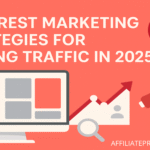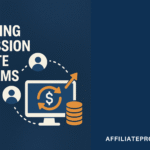Welcome to my article “How to Choose the Right Affiliate Program as a Beginner”.
Starting out in affiliate marketing can feel like stepping into a bustling marketplace where everyone’s shouting about how their program is the best. You’re new, eager, and perhaps a little overwhelmed—like walking into a buffet and not knowing where to start (spoiler alert: it’s dessert). But just like with buffets, not all choices are created equal, and picking the wrong affiliate program can leave you with nothing but a bitter taste and wasted time.
In this guide, we will take a fun but practical dive into how to choose the right affiliate program for beginners. From understanding what your audience wants to spotting red flags in programs, you’ll learn the essentials of setting yourself up for success. By the end, you won’t just pick an affiliate program—you’ll pick the right one. Let’s get started before that buffet runs out of dessert!
My Best Recommended & Proven Way to Make $100-$300 Daily – Watch This FREE Video to START >>>

Understand Your Niche and Audience
Before diving headfirst into the affiliate marketing pool, you need to figure out which lane you’re swimming in—because let’s face it, promoting vegan protein powder to an audience that loves BBQ ribs isn’t going to make you rich. Understanding your niche and audience is step one on the affiliate marketing success ladder, and it’s just as important as choosing the right ladder to climb (pro tip: avoid the wobbly ones).
Your niche is essentially your corner of the internet—the specific topic, industry, or interest you’ll focus on. Whether it’s fitness, tech gadgets, sustainable living, or luxury cat furniture (yes, that’s a thing), the key is to choose a niche you’re passionate about or at least mildly interested in. Why? Because affiliate marketing isn’t a “set it and forget it” deal—it requires consistent effort. If you hate your niche, it’s going to show in your work (and your results).
Now let’s talk audience—the people who will actually click on your links and, hopefully, make purchases. Understanding your audience means knowing what they want, what problems they need solving, and what products they’re likely to throw their hard-earned money at. If your niche is tech, are you speaking to budget-conscious students looking for affordable laptops or seasoned gamers who wouldn’t settle for anything less than a $5,000 gaming rig? The difference is huge—and so is the potential for sales if you nail this step.
To get inside your audience’s head (not literally, please), use tools like Google Trends, Reddit, or even good old-fashioned surveys. Learn their language, figure out their pain points, and align your promotions with their needs. When your audience feels understood, they’re far more likely to trust your recommendations—and that’s where the magic (and commissions) happen.
Remember: picking a niche and understanding your audience isn’t just about what you like; it’s about what they want. Because at the end of the day, you’re not just selling products—you’re solving problems, fulfilling desires, and maybe, just maybe, making their lives a little better. Or at least their cats’ lives with that fancy furniture.
Evaluate Commission Structures and Payment Terms
Alright, let’s talk about the part of affiliate marketing that really gets everyone excited: money. But before you start daydreaming about rolling in cash from your commissions, you need to take a closer look at how much you’ll actually earn—and, more importantly, how and when you’ll get paid. Because not all affiliate programs are created equal, and some might leave you feeling like you worked for free pizza when you were promised steak.
First up: commission structures. This is essentially how you’re paid for the sales or actions you generate. The most common model is Cost Per Sale (CPS), where you earn a percentage of every product sold through your links. It’s straightforward, and if the product has a decent price tag, it can be quite lucrative. Then there’s Cost Per Action (CPA)—which pays you for specific actions like sign-ups or downloads. CPA programs can be great, but make sure the actions required aren’t asking for a customer’s firstborn child (a simple email address will do). And let’s not forget recurring commissions—these beauties keep paying you as long as the customer stays subscribed. It’s like earning royalties, but instead of writing a hit song, you promoted a killer software.
My Best Recommended & Proven Way to Make $100-$300 Daily – Watch This FREE Video to START >>>
Now, let’s get real about payment terms. This is where many beginners trip up. Some programs have low payout thresholds—say, $20—so you can see your earnings relatively quickly. Others, however, might set the bar at $100 or more, meaning you’ll need a steady stream of sales before payday. Then there’s the waiting game: some programs pay weekly, others monthly, and a few seem to operate on a “whenever we feel like it” schedule (hint: avoid these). And always, always check if they support your preferred payment method, whether it’s PayPal, bank transfer, or carrier pigeon.
Lastly, don’t let shiny commission percentages blind you. A 50% commission sounds amazing until you realize it’s for a $10 product, while a 10% cut on a $1,000 product suddenly looks a lot better. Do the math, compare the numbers, and ensure the program aligns with your financial goals. Because at the end of the day, you’re not just here for pocket change—you’re here to build a steady, sustainable income. And maybe splurge on that steak dinner.
Research the Affiliate Program’s Reputation
Choosing an affiliate program without researching its reputation is like buying a car without checking the engine—it might look great on the surface, but you could end up stranded on the side of the road, regretting all your life choices. In the wild west of affiliate marketing, not every program is a goldmine. Some are diamonds in the rough, while others are just… well, rough. So, let’s talk about how to make sure you’re signing up with a program that’s legit, reliable, and worth your time.
Start with the basics: Google is your best friend. A quick search for “XYZ affiliate program reviews” can reveal a lot. If all you find are glowing five-star reviews that sound like they were written by the program’s CEO, dig deeper. Real reviews will give you the good, the bad, and sometimes, the downright ugly. Look for comments on payment reliability, product quality, and how easy (or not) it is to work with the company. Bonus points if you find forums like Reddit discussing the program—because let’s face it, Redditors don’t sugarcoat anything.
Next, check out affiliate communities and forums. These are goldmines for insider knowledge. Experienced affiliates often share their honest opinions about programs, and they won’t hesitate to call out scams. If a program has a history of delayed payments, vague terms, or shady practices, you’ll hear about it here. On the flip side, you might discover hidden gems with rave reviews and dedicated support teams.
Speaking of shady practices, watch out for red flags. A reputable program won’t charge you an upfront fee to join—this isn’t a country club. They’ll also have clear terms and conditions (yes, you need to read those), including how commissions are tracked and paid. If the terms are more confusing than your phone bill, consider it a warning sign.
Lastly, test their customer service before committing. Send them a quick email or use their contact form to ask a question. Do they respond promptly and professionally, or do you hear crickets for weeks? A program with poor communication now is unlikely to improve once you’re an affiliate.
Remember, your time is valuable. Partnering with a reputable affiliate program not only protects your income but also your reputation. After all, you’re recommending these products to your audience—they trust you. And trust, in this business, is worth more than any commission check. Well, almost.
Assess Support and Resources Provided
Joining an affiliate program without checking its support and resources is like showing up to a marathon in flip-flops—you’re technically participating, but you’re going to have a rough time. The best affiliate programs don’t just hand you a link and wish you luck; they equip you with tools, guidance, and a friendly nudge (or two) to set you up for success. Think of it as having a coach instead of just a cheerleader—because let’s be honest, you’ll need more than “You can do it!” to get those conversions rolling in.
Let’s start with resources. Good affiliate programs should provide a toolbox of promotional materials to help you market their products effectively. This could include high-quality banners, product images, pre-written email copy, and even sample social media posts. The idea is to make your life easier and your campaigns more polished. After all, why spend hours designing a graphic when the program already has a shiny, ready-to-go version? Time saved is money earned—or at least more time for coffee breaks.
My Best Recommended & Proven Way to Make $100-$300 Daily – Watch This FREE Video to START >>>
Now, on to training and educational support. Beginner-friendly programs often come with tutorials, webinars, or even a step-by-step guide on how to succeed as an affiliate. Some go the extra mile and provide access to case studies or exclusive forums where you can connect with other affiliates. If you’re a newbie, these resources can be game-changers, helping you avoid the classic “trial and error” phase (which is code for “why isn’t this working?”).
Then there’s the support system. A good affiliate program will have a dedicated team—or at least one really enthusiastic affiliate manager—available to answer your questions, troubleshoot issues, and celebrate your wins. Test their responsiveness before you commit. Fire off a question like, “How do you track referrals?” and see how quickly and thoroughly they respond. If it feels like you’re talking to a ghost, take that as your cue to run.
And let’s not forget about analytics tools. Any decent program will give you access to a dashboard where you can track clicks, conversions, and earnings. If they provide detailed insights—like which links are performing best or what products are trending—it’s a sign they’re invested in your success. If all you get is a vague “you earned $5,” it’s like trying to navigate a maze blindfolded.
Bottom line: the more resources and support a program offers, the smoother your affiliate journey will be. And let’s face it, in a world where tech glitches happen and campaigns don’t always go as planned, knowing there’s someone (or something) in your corner is priceless. Because while affiliate marketing can be a solo gig, the best programs make sure you never feel like you’re going it alone.
Look for Programs with Quality Products or Services
Promoting a product you’ve never used or wouldn’t recommend to your worst enemy is a surefire way to crash your affiliate marketing career before it even takes off. When choosing an affiliate program, you’re not just signing up to earn commissions—you’re tying your reputation to the product or service. And trust me, promoting something that turns out to be a dud is like handing out soggy birthday cake at a party: no one’s happy, and your credibility is toast.
So, what exactly qualifies as a quality product or service? For starters, it’s something that actually solves a problem or fulfills a desire for your audience. Whether it’s an eco-friendly gadget, a game-changing software, or a life-saving kitchen hack, the product should do what it promises—and do it well. Remember, you’re not just selling; you’re vouching for it. And if your audience feels duped, they’ll take their clicks (and trust) elsewhere faster than you can say “refund.”
One way to gauge quality is to read customer reviews and testimonials. Not the overly polished ones on the company’s website, but real, unfiltered reviews on platforms like Amazon, Trustpilot, or Reddit. If most people are raving about the product, you’re likely onto a winner. If the reviews sound like a support group for disappointed buyers, it’s probably best to steer clear.
It’s also smart to choose programs with evergreen products—the kind of stuff that stays relevant year after year. Sure, trending products can bring in quick cash, but they’re like fireworks: flashy for a moment and then gone. Evergreen products, on the other hand, provide a steady stream of commissions without you having to reinvent the wheel every six months.
Oh, and here’s a pro tip: if possible, try the product yourself. This isn’t always feasible (no one’s expecting you to buy a yacht just to test an affiliate link), but whenever you can, get hands-on experience. Your audience will trust your recommendations more if you can back them up with personal insights. Plus, it’s much easier to sell something when you genuinely believe in its value.
Lastly, pay attention to the company behind the product. Are they known for great customer service, or are they infamous for ignoring complaints? Do they stand by their products with guarantees, or do they have a “no refunds, no regrets” policy? A quality product often comes with a quality company—one that values its customers and, by extension, its affiliates.
Remember, your success as an affiliate marketer isn’t just about the numbers—it’s about building trust with your audience. And trust, like a good cake, starts with quality ingredients. So, choose products you’d recommend to a friend (or at least not to your worst enemy). Your commissions—and your reputation—will thank you for it.
Conclusion
Alright, you have made it to the end of this guide—congratulations! Now, let’s wrap things up with a simple truth: choosing the right affiliate program isn’t about getting rich quick; it’s about getting smart. Sure, you could throw a dart at a wall full of affiliate programs and hope for the best, but why risk your time and energy on something that doesn’t align with your goals? With a little research, some careful consideration, and a sprinkle of patience, you can set yourself up for long-term success and steady commissions.
By now, you know the drill. Understand your niche so you can connect with the right audience. Evaluate commission structures so you’re not working for pennies. Check the program’s reputation because, let’s face it, no one wants to partner with a shady operation. Assess the support and resources offered to make sure you’ve got everything you need to succeed. And, most importantly, look for quality products that you can genuinely stand behind. When you check all these boxes, you’re not just choosing a program—you’re choosing a partnership that will help you grow, earn, and maybe even enjoy the ride a little more.
My Best Recommended & Proven Way to Make $100-$300 Daily – Watch This FREE Video to START >>>
Affiliate marketing doesn’t have to be overwhelming or frustrating. It’s about smart choices, trust, and building relationships—not just with the companies you promote, but with your audience too. So, take your time, do your homework, and trust yourself to make the right call. And remember, while the road to affiliate marketing success might have its bumps, it’s a lot smoother when you’re working with solid programs and products.
Now, go forth and make those well-researched affiliate choices—and maybe treat yourself to a celebratory coffee while you’re at it. After all, you have earned it.
Thank you for reading my article “How to Choose the Right Affiliate Program as a Beginner” till the end. Hope it helped you. See you with another article.










